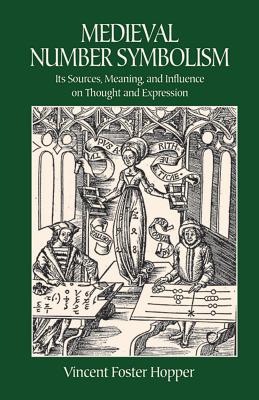Medieval Number Symbolism: Its Sources, Meaning, and Influence on Thought and Expression

Medieval Number Symbolism: Its Sources, Meaning, and Influence on Thought and Expression
For Dante and other people in the Middle Ages, numbers had a different set of connotations than they do for moderns. The symbolism of numbers was both widespread and profoundly ingrained in the culture. In this classic study, a noted scholar reveals "how deeply rooted in medieval thought was the consciousness of numbers, not as mathematical tools, nor yet as the counters in a game, but as fundamental realities, alive with memories and eloquent with meaning."
For example, the number three -- linked to the Trinity -- was of special significance, and "endowed every repetition of the number three with a richness of meaning which can be but dimly grasped by the modern reader." Numbers derived from constellations, planets, stellar revolutions, and other astronomical phenomena were also thought to have divine associations. These and many other aspects of the topic are illuminated here. In the first three chapters, the author examines the three main sources of number symbolism; basic, elementary symbols derived from man's struggles to count and identify such natural groupings as fingers and toes; the ancient Babylonian science of astrology; and Pythagorean number theory, which fixed the relationship of the numbers to one another. The fourth and fifth chapters deal with the Gnostics' elaborate combination of these elements, and the adoption and elaboration of number philosophy by the early Church Fathers. The last two sections examine medieval number philosophy and Dante's use of number symbolism, particularly in The Divine Comedy.
Of special interest to medievalists, numerologists, and students of literature, this volume will also fascinate anyone interested in symbology or cultural aspects of the Middle Ages.
PRP: 91.94 Lei
Acesta este Pretul Recomandat de Producator. Pretul de vanzare al produsului este afisat mai jos.
82.75Lei
82.75Lei
91.94 LeiIndisponibil
Descrierea produsului
For Dante and other people in the Middle Ages, numbers had a different set of connotations than they do for moderns. The symbolism of numbers was both widespread and profoundly ingrained in the culture. In this classic study, a noted scholar reveals "how deeply rooted in medieval thought was the consciousness of numbers, not as mathematical tools, nor yet as the counters in a game, but as fundamental realities, alive with memories and eloquent with meaning."
For example, the number three -- linked to the Trinity -- was of special significance, and "endowed every repetition of the number three with a richness of meaning which can be but dimly grasped by the modern reader." Numbers derived from constellations, planets, stellar revolutions, and other astronomical phenomena were also thought to have divine associations. These and many other aspects of the topic are illuminated here. In the first three chapters, the author examines the three main sources of number symbolism; basic, elementary symbols derived from man's struggles to count and identify such natural groupings as fingers and toes; the ancient Babylonian science of astrology; and Pythagorean number theory, which fixed the relationship of the numbers to one another. The fourth and fifth chapters deal with the Gnostics' elaborate combination of these elements, and the adoption and elaboration of number philosophy by the early Church Fathers. The last two sections examine medieval number philosophy and Dante's use of number symbolism, particularly in The Divine Comedy.
Of special interest to medievalists, numerologists, and students of literature, this volume will also fascinate anyone interested in symbology or cultural aspects of the Middle Ages.
Detaliile produsului








